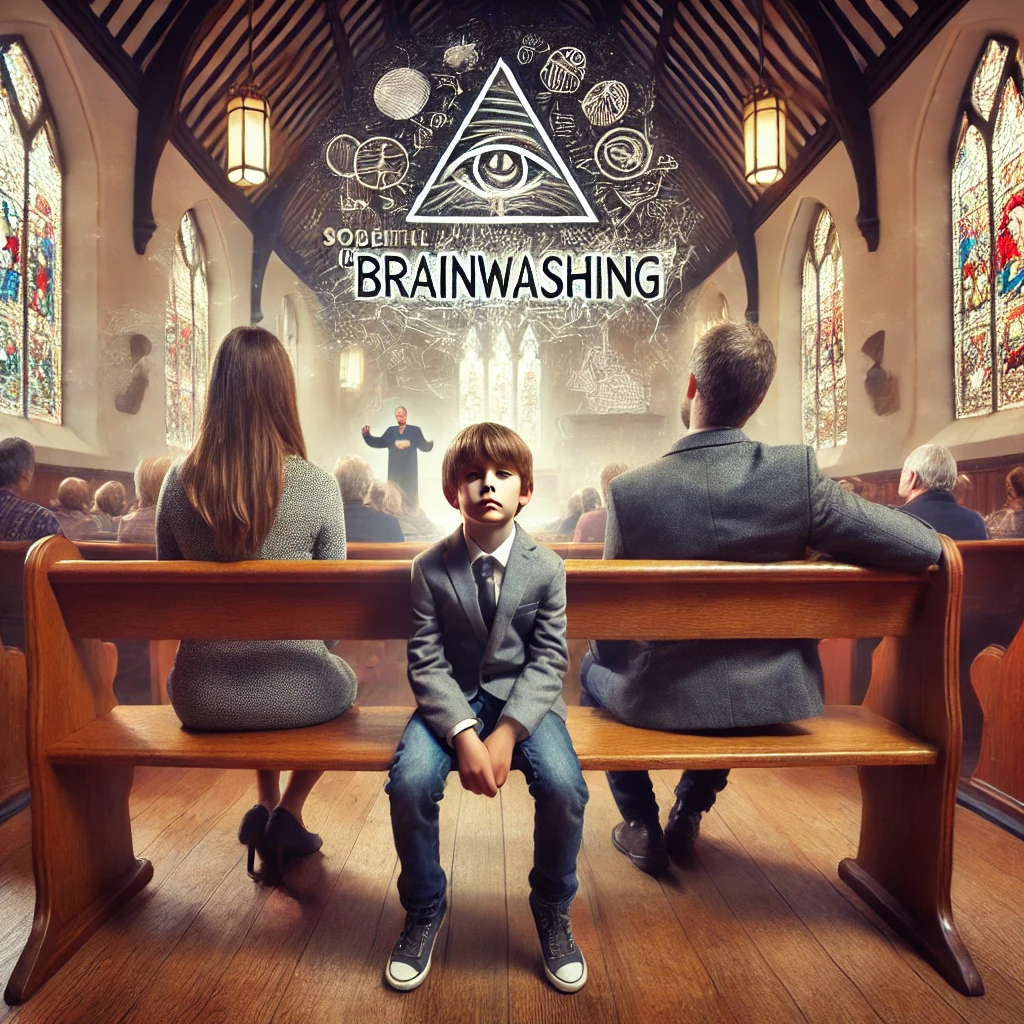Christianity today is a shadow of what it once was—a powerful, transformative movement that challenged the norms of its time and demanded more than passive belief. Instead of embodying the teachings of Jesus, many modern Christians cling to shallow interpretations of faith, handed down without question, and shaped by centuries of human manipulation. This post isn’t for the faint of heart; it’s for those ready to confront the uncomfortable truths about today’s religion and, hopefully, spark a deeper understanding of what it truly means to follow Jesus.
Shallow Thinking and Brainwashing

From a young age, many of us are told what to believe without being encouraged to question why. Christianity often becomes a matter of inheritance rather than introspection. If your parents believed in Jesus, chances are you were raised to do the same—accepting their version of faith as absolute truth. But is that really faith, or is it conformity?
The problem with this inherited belief system is that it discourages critical thinking. Too many Christians today believe in a version of Jesus that aligns conveniently with their personal biases or the traditions they grew up with. They cherry-pick scriptures that justify their actions or condemn others, rather than seeking the full, unaltered truth.
Jesus himself was a radical thinker, someone who challenged societal norms and religious hypocrisy. Yet, modern Christianity has reduced him to a palatable, one-dimensional figure—a distant deity who fits comfortably within people’s narrow worldviews. It’s time to ask the hard questions: Are we truly following Jesus, or just the version of him we’ve been spoon-fed?
Jesus’ Real Teachings vs. Modern Misinterpretations

The Jesus of the Bible taught love, acceptance, and forgiveness. He dined with sinners, showed compassion to the marginalized, and spoke against judgment and hypocrisy. Nowhere did he preach hate or exclusion. Yet, many Christians today use his name to justify discrimination against LGBTQ+ individuals, condemn sinners, or wield scripture as a weapon to shame others.
Let’s set the record straight: Jesus didn’t hate gays. He didn’t shun sinners. In fact, he embraced them. The Pharisees—the religious elite of his time—were the ones he rebuked. He called out their self-righteousness and their obsession with rules over relationships. How ironic that many modern churches mirror the very behaviors Jesus opposed.
This distortion of Jesus’ teachings didn’t happen overnight. The Bible itself has been manipulated throughout history. Consider the Council of Nicaea, where decisions about which texts would become canonical scripture were made by a group of men with political and theological agendas. Or take King James, a monarch known for his own personal controversies—including historical evidence suggesting he was gay. How many Christians even know this? Yet they cling to the King James Bible as the “true” word of God without questioning its origins.
The Hypocrisy of Modern Churches

One of the greatest tragedies of modern Christianity is how many churches have become businesses disguised as places of worship. Tax-free benefits and financial gain have lured countless preachers into ministry, not out of devotion to God, but for personal gain. The result? Sermons that avoid hard truths in favor of feel-good platitudes that keep the congregation happy—and the donations flowing.
These “limp-wristed” preachers, as some might call them, shy away from addressing the real issues. They won’t tell you that living with a partner outside of marriage is wrong. They won’t challenge you to quit smoking even though it’s killing you. They won’t call out the ways your smartphone is controlling your mind. Why? Because they fear losing their followers, their income, or their reputation. Jesus didn’t cater to comfort—he confronted it head-on.

And what about kindness? Modern Christians talk about love and charity, yet many fail to practice it. They’re too busy judging others, too wrapped up in their own self-righteousness to extend a hand to someone in need. It’s as if they’ve forgotten Jesus’ most basic commandment: “Love your neighbor as yourself.”
Rediscovering the True Temple of God

The true temple of God isn’t a building, a church, or a mega-cathedral. It’s within you. Jesus himself said, “The Kingdom of God is within you.” Yet, how often do we hear this from the pulpit?
Gratitude is the cornerstone of this inner temple. Not the shallow gratitude that comes when things are going your way, but the kind that thrives even in hardship. Consider Jesus’ disciples, many of whom faced brutal persecution with gratitude in their hearts. Peter, for instance, chose to be crucified upside down, feeling unworthy to die in the same manner as Jesus. Others sang songs of praise from prison cells. That’s the kind of gratitude that connects us to God—not the superficial acts of thanksgiving we see today.
The Hard Truth: Conformity is Killing Faith

Modern Christianity has fallen into the trap of conformity. Too many people blindly follow the traditions they were raised with, never questioning the inconsistencies or seeking a deeper understanding of scripture. This conformity breeds complacency and stifles genuine faith.
Take the rapture, for example—a concept that’s become a cornerstone of many Christian beliefs. Yet, the Bible says nothing about a rapture as it’s commonly understood today. This idea, popularized in recent centuries, is yet another example of how faith has been shaped more by culture than by scripture. Jesus isn’t coming back to save people in the way they imagine. He already came. He already showed the way. The question is: Are we following it, or are we stuck in our sins and delusions?
Get Some Gratitude
The problem with Christians nowadays isn’t Jesus—it’s how they’ve distorted his teachings. It’s the shallow thinking, the hypocrisy, the failure to practice the radical love and truth he embodied. It’s the blind conformity to tradition and the unwillingness to confront hard truths.
If we truly want to honor Jesus, we need to return to his original message. Stop living in comfort. Start living in truth. Break free from the chains of conformity and seek the unfiltered essence of faith. Because in the end, Jesus didn’t come to fit into our worldviews—he came to shatter them.
Let’s reclaim what is rightfully our’s in this digital noise we live in. Join us in this exploration of how deep the rabbit hole actually goes.

No responses yet